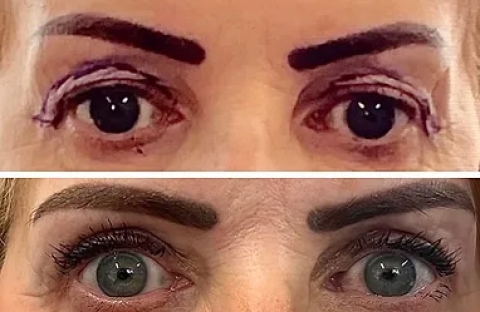


YOUR SURGEON
Mr Bhojwani is a Consultant Eye Surgeon who currently works within the NHS. Graduating from Manchester University in 1998 and training with world class surgeons from the University of Illinois in Chicago, he then underwent further sub-specialty training at Leeds, Birmingham and the Manchester Royal Eye Hospital, gaining his fellowship in Ophthalmology in 2010.
In his NHS consultant role, Mr Bhojwani has been the clinical lead for Ophthalmology across the North Lincolnshire region, developing services in peri-ocular skin cancers, glaucoma, cataract and macular degeneration. He is now the lead surgeon for community day case services at Refine Surgical in Retford.
THE PROCEDURE

Assessment
Before undergoing surgery it is really important to have a fully comprehensive consultation and examination to look for associated medical conditions, check eyelid function and also examine the eye itself, due to the important relationship between the surface of the eye and the eyelid.
It is also important to identify whether the issue is due to just loose skin, or if there is some puffiness to address which usually represents a prolapse of orbital fat.

Anaesthetic
Surgery can be performed under local anaesthetic and although the actual procedure takes around 45 minutes per side, arrival to discharge from the department is around 2-3 hours.
Some patients are apprehensive about local anaesthetic, but if the anaesthetic fluid is warmed to body temperature and the injection performed slowly through a very fine (insulin) needle, then there is usually minimal discomfort and some patients have actually drifted off to sleep during the procedure!

Surgery
If dealing with the orbital fat the Surgeon must go a little deeper into the eye socket itself where the blood vessels, nerves and muscles are.
We use non-absorbable sutures, which are removed after one week.
Serious complications are very rare but it is very important for the patient to have access to the surgical team 24 hours a day, seven days a week for the first few days after surgery.

Aftercare
After the procedure, patients are provided with a post-op pack, which contains sterile swabs and sterile fluid. This should be kept in the fridge and used to make a cold compress to be applied to the closed eye to manage the bruising and swelling.
We recommend patients sleep slightly upright for the first night. Swelling and bruising can persist for up to a week, but usually after a few days a patient can go back to some light duties.
Recent Results
We are very grateful to our patients for consenting to share their stories. The following images are from before and 4 months after upper eyelid surgery. Pre-operatively the excess skin has been marked for removal and post-operatively the surgical site is hidden in the natural lid fold. Aside from the skin encroaching on their peripheral vision especially when reading, applying mascara was also becoming a challenge due to restricted access to the eyelashes.
What our patients say
"Thank you to Dr Bhojwani and his team, they put me at ease straightaway and would recommend anybody thinking having their eyelids done to go ahead. I wish I had it done years ago.
I was having trouble with my bottom eyelashes going into my eyes as well but Dr Bhojwani sorted it all for me."
Jacqueline Doyle



